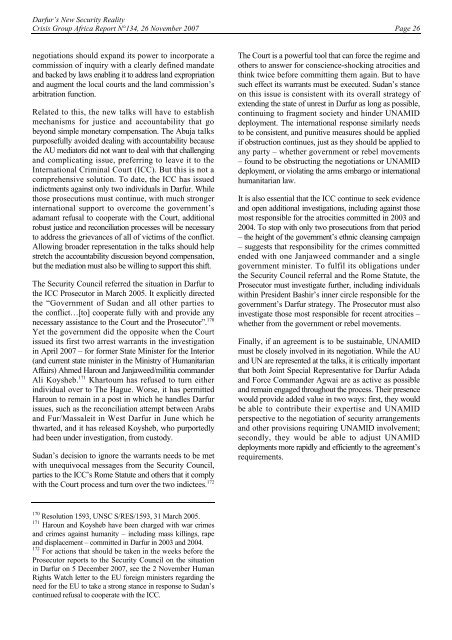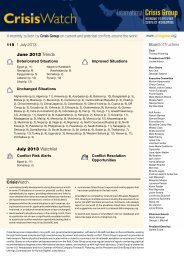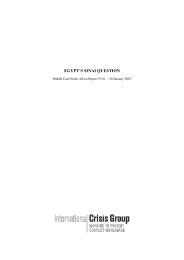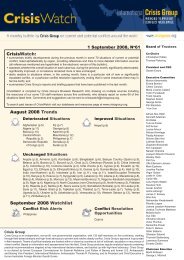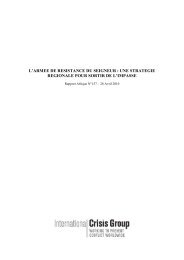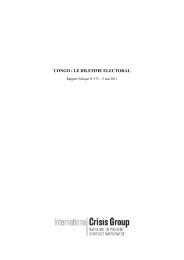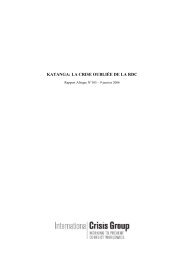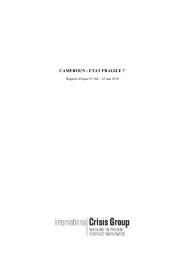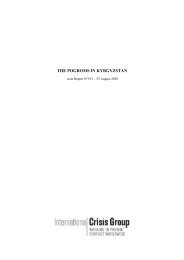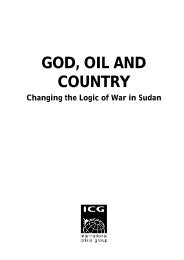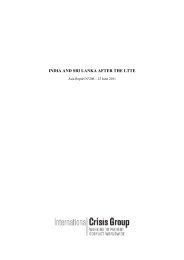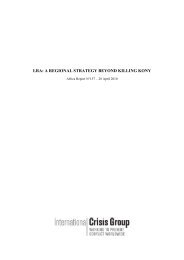sudan - International Crisis Group
sudan - International Crisis Group
sudan - International Crisis Group
You also want an ePaper? Increase the reach of your titles
YUMPU automatically turns print PDFs into web optimized ePapers that Google loves.
Darfur’s New Security Reality<br />
<strong>Crisis</strong> <strong>Group</strong> Africa Report N°134, 26 November 2007 Page 26<br />
negotiations should expand its power to incorporate a<br />
commission of inquiry with a clearly defined mandate<br />
and backed by laws enabling it to address land expropriation<br />
and augment the local courts and the land commission’s<br />
arbitration function.<br />
Related to this, the new talks will have to establish<br />
mechanisms for justice and accountability that go<br />
beyond simple monetary compensation. The Abuja talks<br />
purposefully avoided dealing with accountability because<br />
the AU mediators did not want to deal with that challenging<br />
and complicating issue, preferring to leave it to the<br />
<strong>International</strong> Criminal Court (ICC). But this is not a<br />
comprehensive solution. To date, the ICC has issued<br />
indictments against only two individuals in Darfur. While<br />
those prosecutions must continue, with much stronger<br />
international support to overcome the government’s<br />
adamant refusal to cooperate with the Court, additional<br />
robust justice and reconciliation processes will be necessary<br />
to address the grievances of all of victims of the conflict.<br />
Allowing broader representation in the talks should help<br />
stretch the accountability discussion beyond compensation,<br />
but the mediation must also be willing to support this shift.<br />
The Security Council referred the situation in Darfur to<br />
the ICC Prosecutor in March 2005. It explicitly directed<br />
the “Government of Sudan and all other parties to<br />
the conflict…[to] cooperate fully with and provide any<br />
necessary assistance to the Court and the Prosecutor”. 170<br />
Yet the government did the opposite when the Court<br />
issued its first two arrest warrants in the investigation<br />
in April 2007 – for former State Minister for the Interior<br />
(and current state minister in the Ministry of Humanitarian<br />
Affairs) Ahmed Haroun and Janjaweed/militia commander<br />
Ali Koysheb. 171 Khartoum has refused to turn either<br />
individual over to The Hague. Worse, it has permitted<br />
Haroun to remain in a post in which he handles Darfur<br />
issues, such as the reconciliation attempt between Arabs<br />
and Fur/Massaleit in West Darfur in June which he<br />
thwarted, and it has released Koysheb, who purportedly<br />
had been under investigation, from custody.<br />
Sudan’s decision to ignore the warrants needs to be met<br />
with unequivocal messages from the Security Council,<br />
parties to the ICC’s Rome Statute and others that it comply<br />
with the Court process and turn over the two indictees. 172<br />
170 Resolution 1593, UNSC S/RES/1593, 31 March 2005.<br />
171 Haroun and Koysheb have been charged with war crimes<br />
and crimes against humanity – including mass killings, rape<br />
and displacement – committed in Darfur in 2003 and 2004.<br />
172 For actions that should be taken in the weeks before the<br />
Prosecutor reports to the Security Council on the situation<br />
in Darfur on 5 December 2007, see the 2 November Human<br />
Rights Watch letter to the EU foreign ministers regarding the<br />
need for the EU to take a strong stance in response to Sudan’s<br />
continued refusal to cooperate with the ICC.<br />
The Court is a powerful tool that can force the regime and<br />
others to answer for conscience-shocking atrocities and<br />
think twice before committing them again. But to have<br />
such effect its warrants must be executed. Sudan’s stance<br />
on this issue is consistent with its overall strategy of<br />
extending the state of unrest in Darfur as long as possible,<br />
continuing to fragment society and hinder UNAMID<br />
deployment. The international response similarly needs<br />
to be consistent, and punitive measures should be applied<br />
if obstruction continues, just as they should be applied to<br />
any party – whether government or rebel movements<br />
– found to be obstructing the negotiations or UNAMID<br />
deployment, or violating the arms embargo or international<br />
humanitarian law.<br />
It is also essential that the ICC continue to seek evidence<br />
and open additional investigations, including against those<br />
most responsible for the atrocities committed in 2003 and<br />
2004. To stop with only two prosecutions from that period<br />
– the height of the government’s ethnic cleansing campaign<br />
– suggests that responsibility for the crimes committed<br />
ended with one Janjaweed commander and a single<br />
government minister. To fulfil its obligations under<br />
the Security Council referral and the Rome Statute, the<br />
Prosecutor must investigate further, including individuals<br />
within President Bashir’s inner circle responsible for the<br />
government’s Darfur strategy. The Prosecutor must also<br />
investigate those most responsible for recent atrocities –<br />
whether from the government or rebel movements.<br />
Finally, if an agreement is to be sustainable, UNAMID<br />
must be closely involved in its negotiation. While the AU<br />
and UN are represented at the talks, it is critically important<br />
that both Joint Special Representative for Darfur Adada<br />
and Force Commander Agwai are as active as possible<br />
and remain engaged throughout the process. Their presence<br />
would provide added value in two ways: first, they would<br />
be able to contribute their expertise and UNAMID<br />
perspective to the negotiation of security arrangements<br />
and other provisions requiring UNAMID involvement;<br />
secondly, they would be able to adjust UNAMID<br />
deployments more rapidly and efficiently to the agreement’s<br />
requirements.


